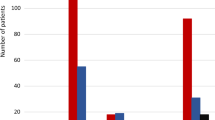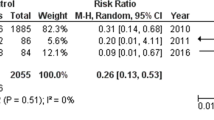Abstract
Background
Effective prescription drug treatment of constipation-predominant irritable bowel syndrome (IBS-C) requires patients to remain on daily therapy, yet predictive factors to optimize treatment selection are unknown.
Aims
We assessed whether common comorbidities including chronic overlapping pain conditions (COPCs), mood disorders, or concurrent medications influence the risk of discontinuing IBS-C prescription drug therapy.
Methods
We included all IBS-C patients who initiated treatment with the secretagogues linaclotide or lubiprostone across the Michigan Medicine healthcare system between 2012 and 2016. A Cox proportional hazards model was constructed to model time-to-treatment discontinuation as a valid, quantifiable measure of IBS medication persistence using hazards ratios (HR) with 95% confidence intervals (CI).
Results
Our cohort included 225 patients on linaclotide and 492 on lubiprostone (mean age 48.3 years, 86.9% women, 46.6% with at least one COPC, 60.3% with at least one mood disorder) with an average follow-up of 2.1 years. Patients with at least one COPC (HR = 0.566; 95%CI = 0.371–0.863) and also women (HR = 0.535; 95%CI = 0.307–0.934) had a lower risk of discontinuing linaclotide, while COPCs predicted a trend toward increased discontinuation of lubiprostone (HR = 1.254; 95%CI = 0.997–1.576). Age, comorbid mood disorders, and baseline use of narcotics or benzodiazepines did not significantly mediate the risk of treatment discontinuation; our findings remained stable in univariate and multivariable analyses.
Conclusions
COPCs and sex appear to influence the likelihood of discontinuation of two commonly prescribed secretagogues, while mood disorders, narcotics, and benzodiazepines may not. Routine assessment for comorbid COPCs prior to initiating therapy may optimize IBS-C treatment selection and outcomes in practice.

Similar content being viewed by others
References
Shah ED, Almario CV, Spiegel BM, Chey WD. Presentation and characteristics of abdominal pain vary by irritable bowel syndrome subtype: Results of a nationwide population-based study. Am J Gastroenterol. 2020;115:294–301.
Doshi JA, Cai Q, Buono JL, Spalding WM, Sarocco P, Tan H et al. Economic burden of irritable bowel syndrome with constipation: A retrospective analysis of health care costs in a commercially insured population. J Manag Care Pharm. 2014;20:382–390.
Black CJ, Ford AC. Global burden of irritable bowel syndrome: Trends, predictions and risk factors. Nat Rev Gastroenterol Hepatol. 2020;17:473–486.
Shah ED, Kim HM, Schoenfeld P. Efficacy and tolerability of guanylate cyclase-C agonists for irritable bowel syndrome with constipation and chronic idiopathic constipation: A systematic review and meta-analysis. Am J Gastroenterol. 2018;113:329–338.
Black CJ, Burr NE, Quigley EMM, Moayyedi P, Houghton LA, Ford AC. Efficacy of secretagogues in patients with irritable bowel syndrome with constipation: Systematic review and network meta-analysis. Gastroenterology. 2018;155:1753–1763.
Black CJ, Burr NE, Ford AC. Relative Efficacy of tegaserod in a systematic review and network meta-analysis of licensed therapies for irritable bowel syndrome with constipation. Clin Gastroenterol Hepatol. 2019. https://doi.org/10.1016/j.cgh.2019.07.007.
Shah ED, Suresh S, Jou J, Chey WD, Stidham RW. Evaluating when and why patients discontinue chronic therapy for irritable bowel syndrome with constipation and chronic idiopathic constipation. Am J Gastroenterol. 2020;115:596–602.
Dulai PS, Peyrin-Biroulet L, Danese S, Sands BE, Dignass A, Turner D et al. Approaches to integrating biomarkers into clinical trials and care pathways as targets for the treatment of inflammatory bowel diseases. Gastroenterology. 2019;157:1032-1043.e1.
Rangan V, Ballou S, Shin A, Camilleri M, Lembo A, Nee J et al. Use of treatments for irritable bowel syndrome and patient satisfaction based on the IBS in America survey. Gastroenterology. 2020;158:786-788.e1.
Singh P, Ballou S, Katon J, Takazawa E, Rangan V, Mukherjee R et al. Symptom severity, mood, and healthcare use are associated with satisfaction in patients with irritable bowel syndrome. Clin Gastroenterol Hepatol Off Clin Pract J Am Gastroenterol Assoc. 2020. https://doi.org/10.1016/j.cgh.2020.01.045.
Osadchiy V, Martin CR, Mayer EA. The gut–brain axis and the microbiome: Mechanisms and clinical implications. Clin Gastroenterol Hepatol. 2019;17:322–332.
Maixner W, Fillingim RB, Williams DA, Smith SB, Slade GD. Overlapping chronic pain conditions: Implications for diagnosis and classification. J Pain. 2016;17:T93-107.
Lee YC, Nassikas NJ, Clauw DJ. The role of the central nervous system in the generation and maintenance of chronic pain in rheumatoid arthritis, osteoarthritis and fibromyalgia. Arthritis Res Ther. 2011;13:211.
Ballou S, Beath A, Kaptchuk TJ, Hirsch W, Sommers T, Nee J et al. Factors associated with response to placebo in patients with irritable bowel syndrome and constipation. Clin Gastroenterol Hepatol. 2018;16:1738-1744.e1.
Lackner JM, Ma C, Keefer L, Brenner DM, Gudleski GD, Satchidanand N et al. Type, rather than number, of mental and physical comorbidities increases the severity of symptoms in patients with irritable bowel syndrome. Clin Gastroenterol Hepatol. 2013;11:1147–1157.
Peterson AM, Nau DP, Cramer JA, Benner J, Gwadry-Sridhar F, Nichol M. A checklist for medication compliance and persistence studies using retrospective databases. Value Health. 2007;10:3–12.
Hanauer DA, Mei Q, Law J, Khanna R, Zheng K. Supporting information retrieval from electronic health records: A report of University of Michigan’s nine-year experience in developing and using the Electronic Medical Record Search Engine (EMERSE). J Biomed Inform. 2015;55:290–300.
Goff SL, Feld A, Andrade SE, Mahoney L, Beaton SJ, Boudreau DM et al. Administrative data used to identify patients with irritable bowel syndrome. J Clin Epidemiol. 2008;61:617–621.
Linaclotide (Linzess) for constipation. Med Lett Drugs Ther. 2012;54:91–2.
Cramer JA, Roy A, Burrell A, Fairchild CJ, Fuldeore MJ, Ollendorf DA et al. Medication compliance and persistence: Terminology and definitions. Value Health. 2008;11:44–47.
Shah ED, Chang L, Salwen-Deremer JK, Gibson PR, Keefer L, Muir JG, et al. Contrasting clinician and insurer perspectives to managing irritable bowel syndrome: Multilevel modeling analysis. Am J Gastroenterol. 2020
Shah ED, Salwen-Deremer JK, Gibson PR, Muir J, Eswaran S, Chey WD. Comparing costs and outcomes of treatments for irritable bowel syndrome with diarrhea: Cost-benefit analysis. Clin Gastroenterol Hepatol
Shah ED, Saini SD, Chey WD. Value-based pricing for rifaximin increases access of patients with irritable bowel syndrome with diarrhea to therapy. Clin Gastroenterol Hepatol. 2019;17:2687-2695.e11.
Kim JH, Lin E, Pimentel M. Biomarkers of irritable bowel syndrome. J Neurogastroenterol Motil. 2017;23:20–26.
Castro J, Harrington AM, Hughes PA, Martin CM, Ge P, Shea CM, et al. Linaclotide inhibits colonic nociceptors and relieves abdominal pain via guanylate cyclase-C and extracellular cyclic guanosine 3’,5’-monophosphate. Gastroenterology. 2013;145:1334–1346.e1-11.
Hearn M, Whorwell PJ, Vasant DH. Stigma and irritable bowel syndrome: A taboo subject? Lancet Gastroenterol Hepatol. 2020;5:607–615.
Turk DC, Wilson HD, Cahana A. Treatment of chronic non-cancer pain. Lancet. 2011;377:2226–2235.
Singla M, Laczek JT. A stick and a burn: Our approach to abdominal wall pain. Am J Gastroenterol. 2020;115:645–647.
Pichetshote N, Pimentel M. An approach to the patient with chronic undiagnosed abdominal pain. Am J Gastroenterol. 2019;114:726–732.
Almario CV, Spiegel BMR. Employing irritable bowel syndrome patient-reported outcomes in the clinical trenches. Clin Gastroenterol Hepatol. 2018;16:462-466.e2.
Bennet SM, Keshteli AH, Bercik P, Madsen KL, Reed D, Vanner SJ. Application of metabolomics to the study of irritable bowel syndrome. Neurogastroenterol Motil. 2020. https://doi.org/10.1111/nmo.13884.
Shah ED, Farida JD, Menees S, Baker JR, Chey WD. Examining balloon expulsion testing as an office-based, screening test for dyssynergic defecation: A systematic review and meta-analysis. Am J Gastroenterol. 2018;113:1613–1620.
Taylor DCA, Abel JL, Martin C, Doshi JA, Essoi B, Korrer S et al. Comprehensive assessment of patients with irritable bowel syndrome with constipation and chronic idiopathic constipation using deterministically linked administrative claims and patient-reported data: The chronic constipation and IBS-C treatment and outcomes real-world research platform (CONTOR). J Med Econ. 2020;23:1072–1083.
Funding
Dr. Shah was supported by the AGA Research Foundation’s 2019 AGA-Shire Research Scholar Award in Functional GI and Motility Disorders. Dr. Shah received funding from the NIH T32 Training Grant in Epidemiology and Health Services (DK062708).
Author information
Authors and Affiliations
Corresponding author
Ethics declarations
Conflicts of interest
Dr. Shah and Dr. Chen have no disclosures. Dr. Brenner has served as a consultant, advisor, and/or speaker for Ironwood, Allergan (Abbvie), Salix, Takeda, and Alfasigma pharmaceuticals. Dr. Brenner is also supported in research by an unrestricted gift from the Irene D. Pritzker Foundation.
Disclosures
Dr. Shah and Dr. Chen have no disclosures. Dr. Brenner has served as a consultant, advisor, and/or speaker for Ironwood, Allergan (Abbvie), Salix, Takeda, and Alfasigma pharmaceuticals. Dr. Brenner is also supported in research by an unrestricted gift from the Irene D. Pritzker Foundation.
Additional information
Publisher's Note
Springer Nature remains neutral with regard to jurisdictional claims in published maps and institutional affiliations.
Supplementary Information
Below is the link to the electronic supplementary material.
Rights and permissions
About this article
Cite this article
Shah, E.D., Brenner, D.M. & Chen, V.L. Baseline Predictors of Discontinuation of Prescription Drug Therapy for IBS-C: Cohort Analysis at an Integrated Healthcare System. Dig Dis Sci 67, 1213–1221 (2022). https://doi.org/10.1007/s10620-021-06963-x
Received:
Accepted:
Published:
Issue Date:
DOI: https://doi.org/10.1007/s10620-021-06963-x




